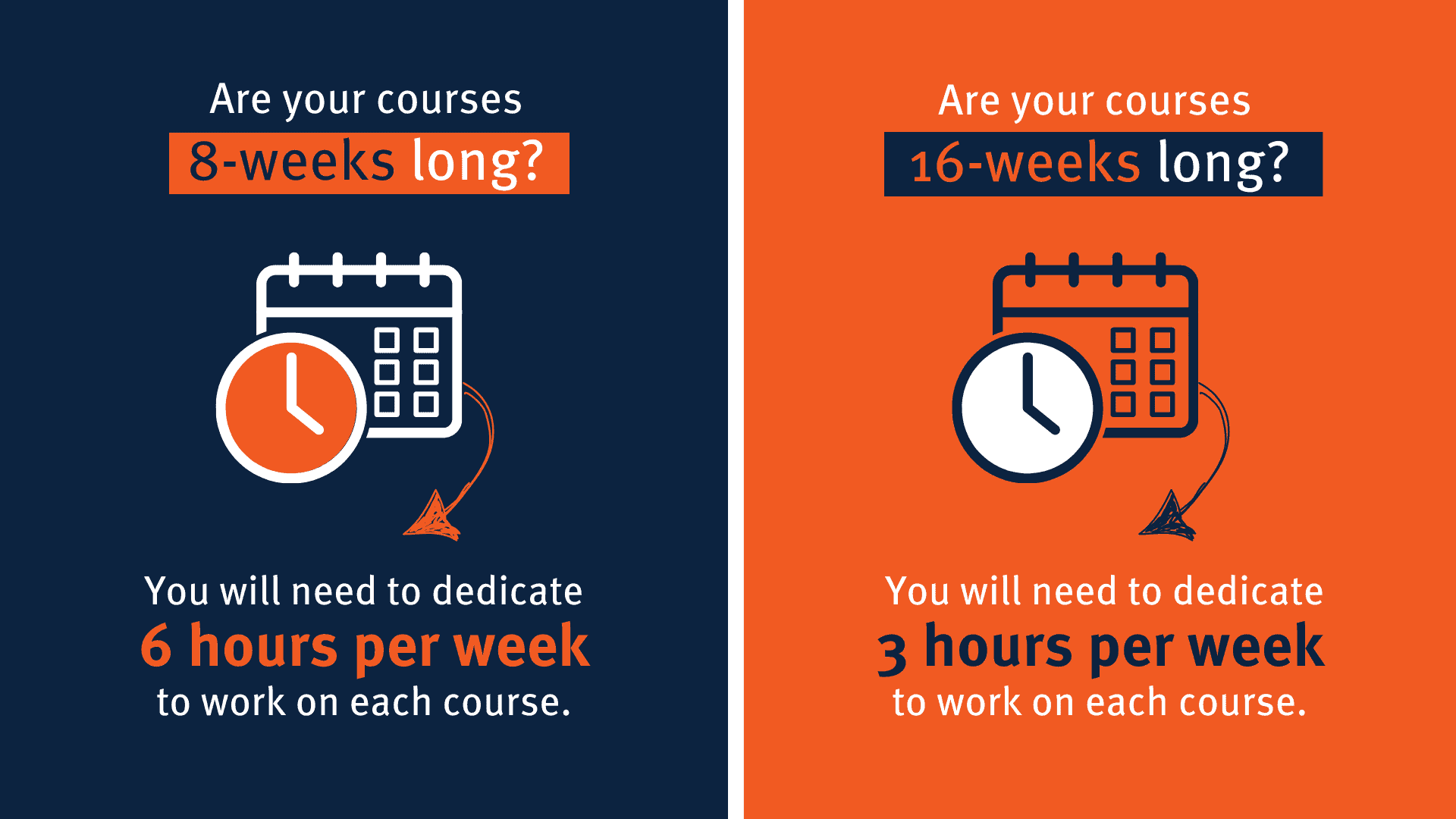 Are you considering earning a degree, but you aren’t sure how to balance work and school without feeling overwhelmed? Juggling two major areas of your life can be a challenging but rewarding journey.
Are you considering earning a degree, but you aren’t sure how to balance work and school without feeling overwhelmed? Juggling two major areas of your life can be a challenging but rewarding journey.
As a busy adult in college, managing work and class deadlines effectively will be essential. The key to success lies in finding a balance that allows you to excel in both areas without compromising your well-being.
While it may seem challenging, working while studying offers valuable benefits. For example, you’ll gain practical experience that can complement your academic knowledge. This combination can make you more competitive in the job market. Additionally, maintaining a job provides financial stability, which can help cover tuition fees and other expenses.
At UTSA Online, we know you have a lot on your plate. That’s why our programs are built for busy adults like you. We offer the flexibility and support you need so you can build the life you deserve. UTSA also has a great Student Success resources page with multiple great tips to help you succeed.
Our classes are all 100% online with no meeting times. You’ll have due dates for your tests and quizzes each week, but you get to set your own schedule during the week for when you study. Additionally, you’ll have a dedicated academic advisor who will help you stay on track for graduation.
Balancing work and school doesn’t have to be overwhelming. Below, we’ll discuss tips and strategies you can implement so you can be successful.
Benefits of Balancing Work and School
There are a lot of benefits to balancing work and school. Let’s review a few of them:
- Real-World Application of Knowledge: At UTSA Online, you’ll learn real-world skills that you can apply to your current or future positions.
- Networking Opportunities: Working while studying can expand your network. You’ll interact with colleagues, classmates, and professors regularly. This means you’ll have the opportunity to build connections with different people across industries.
- Discipline and Motivation: You’ll need to be disciplined and self-motivated when balancing a busy schedule. These are valuable skills that are important in multiple aspects of your life, including work, school, health, and more.
- Time Management Skills: You’ll need to use time management skills to balance your work and school responsibilities. Being able to efficiently allocate your time will be invaluable and can help you beyond your time in the classroom.
- Personal Growth and Confidence: As you manage school and work successfully, you’ll start to see personal growth and an increased confidence. You’ll feel such a sense of accomplishment through achieving your goals.
Your education will provide benefits to more people than just you. Check out this post on how your education will benefit your family.
“I have so much more confidence now. I feel like I can do anything with work. I feel like I can do anything with school. I feel like I can do any challenge that comes up. Because of UTSA online, I know I can accomplish it.”
– Sallye Barnes ‘23 – B.A. in Communication – UTSA Online

Set Realistic Goals
You have a lot on your plate, so make sure you set realistic academic and professional goals. When your goals are achievable, you’ll feel more confident in your ability to succeed. This will help you manage stress more effectively along the way.
Start by defining your long-term goals – whether that’s finishing your degree, advancing or changing your career, or both. Be specific about what you want to accomplish and why it matters to you. Understanding your personal motivation – your ‘why’ – can keep you focused and driven when challenges arise.
Once you set your larger goals, break them down into smaller pieces. Having manageable steps makes a goal easier to achieve. For example, if you want to finish your degree, focus on what you need to do one semester at a time. Achieving smaller milestones will help keep you motivated and moving forward.
Clear long-term goals are essential, but success comes from focusing on the steps needed to reach them. Taking it one step at a time prevents overwhelm and helps you maintain steady progress.
While it’s important to set deadlines for each step to help you stay accountable and maintain momentum, it’s also ok if those deadlines need to be adjusted. Regularly reviewing and adjusting your goals keeps you motivated and on track.
And don’t forget to celebrate your progress along the way. It’s a great way to stay inspired to keep working.
Time Management Strategies
Prioritize Your Time
Effective time management starts with setting clear priorities. Each week, review your upcoming commitments. Identify which assignments from work and your courses are the most important ones. Plan your responsibilities down to the smallest of tasks.
Focus on completing high-priority items first. This allows you to dedicate your energy and resources to what has the greatest impact on your goals. By addressing critical responsibilities early, you can avoid feeling overwhelmed. As you cross off items, you’ll feel accomplished and motivated to continue working through your list.
This approach helps you manage your time more efficiently, breaking down tasks into manageable parts and reducing stress.
The below graphic will help you determine an approximate amount of time you’ll want to dedicate to each class per week. Keep this in mind when setting your priorities.

Create a Schedule
Once you know your tasks, add them to your calendar. Developing a schedule is essential for balancing work and school. At UTSA Online, you’ll have the flexibility you need to create a schedule that fits your lifestyle.
We recommend looking at your assignments for the entire week, and then adding them to a daily calendar. This way, you’ll be able to see all your weekly tasks while knowing what day you’d like to accomplish each one.
- Weekly Schedule: You may want to allocate specific days for work, study, and personal time. For instance, you might dedicate Monday, Tuesday, and Saturday to schoolwork, while Wednesday, Thursday and Friday are set aside for work. Then you can rest on Sunday.
- Daily Schedule: Maybe your work schedule doesn’t allow you to set aside full days for classes, and that’s ok. Instead, break down your day into blocks of time for different activities. For example, if you work a full-time job, you could dedicate between 6 a.m. and 8 a.m. to classes. Or you can study from 7 p.m. to 9 p.m.
Whether you’re an early bird or a night owl, make sure to set a schedule that works best for you.
Utilize Technology
Did you know there’s an app for that? Using technology can help you manage your time effectively. There are so many options for tools and apps that are designed to help you stay organized and productive.
There are productivity tools like Google Calendar, Trello or Monday, as well as note-taking apps like Evernote. All these options can help you streamline your workflow. Many apps offer free versions, so you can test them before committing.
Research and try different apps to find one that best suits your needs.
Effective Study Habits
You’ve set your goals and created a study schedule that works best for you. Next, it’s crucial that you have effective study habits. You’ll want to use your study time efficiently, which can improve your academic performance.
Remember, everyone learns in a unique way. Find the way you learn best so you can incorporate the proper learning techniques into your study habits. You’ll also want to have a good home workspace that minimizes distractions so you can focus.
Make sure you know the expectations for each class and have the materials you need when you sit down to study. Once you know your learning style, you can incorporate techniques like outlining your notes, re-writing your notes, making flashcards, and more.
You can even use Artificial Intelligence (AI) to help you study. For example, you can add some notes to a program like ChatGPT and can ask it to quiz you on that information. Remember to never include personal information into an AI program. For information on using AI ethically and responsibly, check out UTSA’s AI Essentials: Guidelines and Approaches, as well as the FREE AI Essentials course.
By consistently applying these and other techniques, you can enhance your learning efficiency and academic success.
Maintaining Your Well-being
Self-Care Practices
Balancing work and school can be demanding, so it’s essential to take care of your physical and mental health. Regular exercise, a balanced diet, and adequate sleep are vital to maintaining your well-being and managing stress. You can also try practices like meditation, deep breathing, or yoga to help reduce stress.
Avoiding burnout is crucial for long-term success. Make sure to schedule regular breaks and leisure activities to recharge. Finding moments for relaxation and rejuvenation can help you stay motivated and productive.
Family and Social Support
Having a strong support network can make a significant difference in managing work and school. Family, friends, and colleagues can provide emotional support, encouragement, and practical assistance. Don’t hesitate to reach out to them when you need help.
Connecting with Peers
 Just because your classes are online doesn’t mean you can’t build connections! Engaging with fellow students can enhance your learning experience. Forming study groups, participating in online discussions, and networking with peers can provide valuable insights and support.
Just because your classes are online doesn’t mean you can’t build connections! Engaging with fellow students can enhance your learning experience. Forming study groups, participating in online discussions, and networking with peers can provide valuable insights and support.
Many professors create group chats on various platforms, making it easy to collaborate and learn together. At UTSA Online, you’re part of the Roadrunner community, so you’ll always have support.
You’ll even have an opportunity to become part of the UTSA Online Roadrunner Peer Mentors Program!
As a new UTSA Online student, you can be matched with an experienced UTSA Online student. Your peer mentor will share insights on academics, online learning strategies, and more.
Once you become an expert at navigating the online landscape, you’ll have the chance to give back. Become a peer mentor and support incoming students, strengthening the Roadrunner community. You’ll learn more about this program after you enroll.
How You Can Get Started with UTSA
Balancing work and school effectively requires a combination of time management, effective study habits, and a strong support network. By implementing the strategies discussed in this blog, you can achieve your academic and professional goals while maintaining your well-being.
If you’re looking for a flexible degree program that accommodates your busy schedule, consider exploring UTSA Online’s offerings. With a variety of programs designed for working adults, UTSA Online can help you advance your education and career simultaneously.
Interested in one of UTSA’s 100% Online programs?
UTSA Online offers several 100% online programs, including bachelor’s, master’s, and post-graduate certificate programs. Explore all our programs to find which one is right for you.
If you are ready to start your career path, contact UTSA Online’s Undergraduate Enrollment Team at 210-458-4000 or [email protected], or the UTSA Online Graduate Enrollment Team at 210-458-4400 or [email protected].



